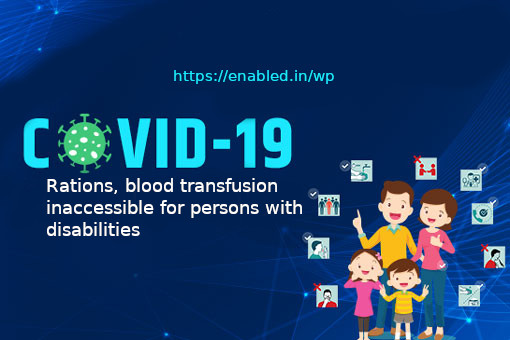The collateral damage of Covid 19 is beginning to emerge. On 29th March, the National Centre for Promotion of Employment for Disabled People (NCPEDP) tweeted helpline numbers and an email that persons with disabilities could call for complaints. The helpline is abuzz. People are suffering for basic needs.

1. Childbirth
A person with a disability in Nagpur has not been able to take his pregnant wife to the hospital as there is no transportation available due to the lockdown.
2. Blood transfusion
Many people with thalassemia are facing difficulty in blood transfusion as limited blood is available in hospitals. Many private hospitals have ceased to deliver their services. For persons who do not have private transportation, arranging transportation for basic health services is a major task.
3. Rations
In Maharashtra, though the Social Welfare Ministry announced that ration for persons with disabilities will be delivered at home, the same has not been pursued urgently by the Government. It becomes difficult for persons with disabilities who have mobility issues and high support needs to step out for buying essentials. Amar (name changed) in Rajkot, (Gujarat) has been instructed to be present in person to receive his rations – Amar is a person with orthopaedic disability and is bedridden. (The authorities have refused to hand over the rations to his sister although she stays with him). Caregivers need passes to collect benefits on behalf of persons with disabilities – and this is proving to be a challenge.
4. Pension
The extra pension of Rs. 1000 announced by the Finance Minister in her economic package concerning COVID 19 has also not been made available till now. Moreover, in view of the rising prices of essential commodities, this amount is far from sufficient.
5. Daily wage workers
These people are suffering regardless of their condition, but in Hooghly, West Bengal, a blind daily wage worker is unable to purchase rations as he has run out of money.
“The Covid 19 pandemic has been declared to be a disaster by the National Disaster Management Authority. This Authority is headed by no less than the Hon’be Prime Minister, who said, “To save the life of each and every Indian is our top most priority.” It is the need of the hour that this assurance becomes the lived experience of all persons with disabilities in India,” shares Arman Ali, Executive Director, NCPEDP.
On March 26, the Department of Empowerment of Persons with Disabilities (GOI) issued superbly drafted Disability Inclusive Guidelines to secure the protection and safety of persons with disabilities during this crisis. But even a week later, its benefits are yet to reach all those for whom they are intended. One key reason for this is that Disability Commissioners have been designated as nodal officers under the GOI Guidelines, but in many states Disability Commissioners have either not been appointed, are hard to reach, or are unresponsive.
The NCPEDP has been tracking some positive news on its helpline too- Karnataka and Assam have developed videos and circulated information on Covid19 widely through their social media platforms. Karnataka has made it available in its regional languages as well as sign language. Uttarakhand has facilitated easy movement of caregivers, as well as any assistance required by persons with disabilities in terms of food, medicines or counselling. Separate helpline numbers have been set up for persons with disability in states such as Tamil Nadu and Maharashtra. Jharkhand and Delhi Government have issued special e-passes specific for persons with disabilities. For people with hearing impairment, states such as Tamil Nadu, Punjab and Karnataka have enacted video conferencing facilities with sign language interpreters. The state of Telangana, Karnataka and Tamil Nadu have implemented the centre’s order of exemption of employees with disabilities from their roster of staff required to attend essential services within their respective Ministries/ Departments.
“Persons with disabilities are in all the 28 states, not just the few that are taking proactive steps. The fundamental right to life and dignity cannot be dispensed with even in a medical emergency. People with disabilities are not a homogenous, distinct group – they are to be found in every strata of society and in every aspect of life and they need to be enabled during this pandemic,” shares Arman Ali.
Persons with disabilities needing assistance can call NCPEDP at 73039 44839